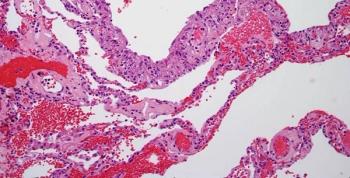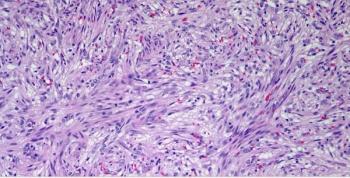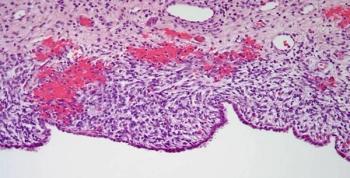
A set of autoantibodies was found to be associated with lung adenocarcinoma when compared to smoker control patients, according to a new study.

Your AI-Trained Oncology Knowledge Connection!


A set of autoantibodies was found to be associated with lung adenocarcinoma when compared to smoker control patients, according to a new study.

Allocating chemotherapy treatment based on a comprehensive geriatric assessment failed to improve treatment failure-free survival or overall survival in elderly patients with advanced non–small-cell lung cancer.

Some adult-onset cancer survivors have an increased risk of developing cardiovascular disease later in life compared to noncancer controls.

The term “HER2-positive lung cancer” may actually refer to two distinct entities, according to a new study. HER2 mutations and HER2 amplifications were found in similar numbers of lung adenocarcinoma cases, but they did not occur in the same samples, suggesting HER2-targeted agents should differentiate between mutation and amplification.

A 42-year-old woman presents with bilateral cystic changes in the lungs. What is your diagnosis?

The use of low molecular-weight heparin failed to improve either metastasis-free or overall survival in newly diagnosed lung cancer patients.

Patients diagnosed with non-small-cell lung cancer (NSCLC) at a younger age are far more likely to harbor a targetable genomic alteration than older patients.

This review outlines the diagnostic and therapeutic challenges associated with the increased number of screen-identified indeterminate lung nodules, highlighting currently recommended follow-up and management algorithms, as well as the various methods of nodule localization, tissue diagnosis, and definitive local therapeutic modalities.

Radiologic screening for lung cancer had a long and unsuccessful history until the advent of low-dose computed tomography (CT) screening and the completion of the National Lung Screening Trial, which demonstrated an improvement in lung cancer–specific mortality in a high-risk population.

A study showed that the use of intraoperative frozen section diagnosis correlated strongly with final pathology for peripheral small-sized lung adenocarcinoma.

A 41-year-old woman presents with cough and dyspnea. After further evaluation, a bronchial mass is identified and a biopsy is performed. What is your diagnosis?

The ALK inhibitor alectinib was highly active and well-tolerated in patients with ALK-rearranged, crizotinib-refractory, advanced non–small-cell lung cancer.

The FDA has approved necitumumab (Portrazza) in combination with chemotherapy for the treatment of patients with metastatic squamous non-small-cell lung cancer.

The FDA granted accelerated approval to osimertinib (Tagrisso), previously known as AZD9291, for treatment of advanced non-small-cell lung cancer (NSCLC) with the EGFR mutation T790M.

Early-stage lung cancer patients considered to be high risk for surgery can achieve good clinical outcomes with surgical resection, according to a new study.

Pembrolizumab, a PD-1 inhibitor, demonstrated better overall survival and progression-free survival vs docetaxel in non–small-cell lung cancer patients.

This slide show highlights some of the cutaneous side effects related to the use of epidermal growth factor receptor inhibitors (EGFRI).

A large cystic lung mass is found in the right upper lobe of a 3-year-old boy. After further evaluation, a biopsy is performed. What is your diagnosis?

A study looking at trends from 1985 to 2005 found that overall survival has increased in Medicare patients with small-cell lung cancer, and that treatment with chemotherapy is associated with improved survival.

Patients with ALK-rearranged non–small-cell lung cancer and brain metastases survive longer when treated with radiotherapy and tyrosine kinase inhibitors.

The US Food and Drug Administration expanded the approval of the anti-PD-1 immunotherapy agent nivolumab to include advanced non-squamous non-small-cell lung cancer.

In this interview we discuss a new trial involving the antibody-drug conjugate IMMU-132 as well as the future of chemotherapy in the treatment of lung cancer.

Patients with stage IV squamous cell lung cancer positive for an EGFR gene copy number biomarker saw a survival benefit when adding cetuximab to chemotherapy.

Seventy-five percent of patients diagnosed with metastatic adenocarcinoma of the lung before age 40 have an actionable mutation, according to preliminary results from the Genomics of Young Lung Cancer Study.

The incidence of NSCLC among self-reported never-smokers appears to be increasing, according to authors of two retrospective studies presented at the 2015 World Conference on Lung Cancer.